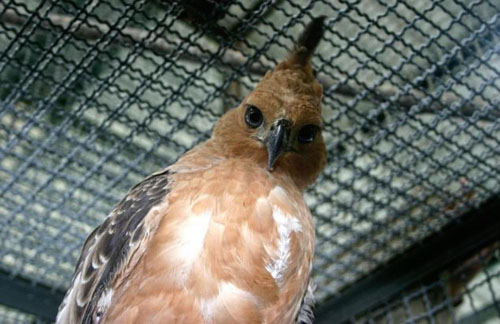
Traffic Media Relea
Trade wiping out Indonesia’s bird species
Jakarta,
Indonesia, 26th May 2016 — A
new study has revealed that 13 bird species—including Indonesia’s national
bird, the Javan Hawk-eagle—found in Sundaic Indonesia are at serious risk of
extinction because of excessive over-harvesting.
The study also finds that an additional 14 bird subspecies are in danger of extinction. The driver behind this crisis is the enormous demand for birds for the domestic pet trade.
The keeping
of birds as pets in Indonesia is an integral part of the national culture, yet
the high levels of demand for some species have fuelled excessive hunting with
the populations of many rapidly disappearing.
Besides the Javan Hawk-eagle, the other full species at risk include the Silvery Woodpigeon, Helmeted Hornbill, Yellow-crested Cockatoo, Scarlet-breasted Lorikeet, Javan Green Magpie, Black-winged Myna, Bali Myna, Straw-headed Bulbul, Javan White-eye, Rufous-fronted Laughingthrush, Sumatran Laughingthrush and Java Sparrow.
Although most
of them are kept as pets, the Helmeted Hornbill is an exception: as TRAFFIC
recently revealed, thousands are being illegally killed and traded for their
unique solid bill casques, carved as a substitute for elephant ivory, to meet
demand in China.
Another of
them, the Javan Green Magpie, was recognized as a full species as recently as
2013—and simultaneously documented as in grave danger of extinction owing to
trade pressure. In direct response, the Threatened Asian Songbird Alliance
(TASA), operating as a formal body of the European Association of Zoos and
Aquaria (EAZA), initiated a programme of captive breeding in a number of zoos,
as assurance colonies, for security and propagation purposes.
Such
conservation breeding is the last hope for some of the taxa affected. According
to the study: “Regrettably five subspecies…are probably already extinct, at
least in the wild, due primarily to trade.” They include one subspecies of a
parrot (Scarlet-breasted Lorikeet), three subspecies of White-rumped Shama, an
accomplished songster and one of the Hill Myna, popular because of its ability
to mimic human voices.
“Whether its
species or subspecies, the message is the same: excessive trade is wiping out
Indonesia’s wild bird species at an alarming rate” said Dr Chris Shepherd,
TRAFFIC’s Director for Southeast Asia, and a co-author of the study.
“Despite the
alarming scale and consequences of the bird trade, governments and even conservation
organizations often don't view this issue as a high priority. This hampers
efforts to prevent further losses.”
The solutions
to the bird trade crisis in Indonesia lie in a combination of better law
enforcement, public awareness campaigns, in situ management, conservation
breeding, conversion of trappers to wardens and field, market and genetic
surveys, say the study’s authors.
Meanwhile as
certain favoured species disappear because of trapping, others are targeted as
“next-best” substitutes, while commercial breeders sometimes hybridise taxa for
“better” effects, leading to further conservation complexities.
The study’s
authors also consider whether commercial breeding could help alleviate the
situation, but conclude that “while attractive in theory, [commercial breeding]
presents difficulties that are probably insurmountable in practice.”
Trade-driven
extinctions and near-extinctions of avian taxa in Sundaic Indonesia
was published in Forktail, the
journal of the Oriental Bird Club.
Photo of
Javan Hawk Eagle and poster: https://www.dropbox.com/sh/3elqlgwdu9cbnya/AAAJOP1xQ-pdaDnvVQBw2XqOa?dl=0
For
further information, contact:
Dr Chris R.
Shepherd, Regional Director for TRAFFIC in Southeast Asia Tel: 03-7880 3940
Email: chris.shepherd@traffic.org
About
TRAFFIC
TRAFFIC, the
wildlife trade monitoring network, works to ensure that trade in wild plants
and animals is not a threat to the conservation of nature. TRAFFIC is a strategic
alliance of IUCN and WWF. www.traffic.org